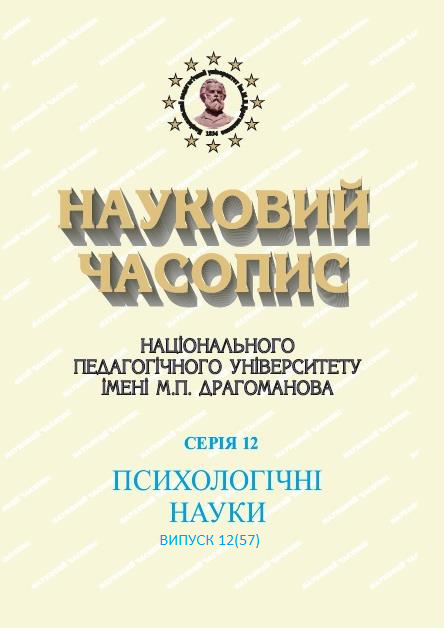RESEARCH OF THE SCHEMATIZATION ABILITY OF PH. Ds AS A MECHANISM OF THEIR PROFESSIONAL THINKING AND THOUGHT COMMUNICATION
DOI:
https://doi.org/10.31392/NPU-nc.series12.2020.12(57).02Keywords:
schematization, scheme, mental activity, candidates for the degree of Doctor of Philosophy (Ph.D.), scientific activityAbstract
The article is devoted to the study of the schematization ability of candidates for the degree of Doctor of Philosophy (Ph.D.) as a mechanism of their professional thinking and thought communication. It gives an analysis of the main provisions of modern psychological science on understanding the essence of schematization as a tool of professional thinking and thought communication, and the ability of schematization as a leading professional quality of a scientist which should be formed at the stage of his professional training. Research methods: theoretical (analysis: theoretical, terminological; generalization, systematization, classification); empirical (diagnostic methods adapted to research tasks: survey, testing, self-assessment); mathematical statistics (method of averages, correlation analysis using IBM SPSS Statistics v.23). According to the results of an empirical research, most Ph.D. candidates who took part in the diagnosis have insufficient knowledge (at the level of intuitive knowledge) about the essence of schemes, awareness of their place among other methods of visualization, as well as types and principles of construction, which makes it impossible to characterize their ability to schematize as conscious, reflected. Moreover, most candidates for the degree of Doctor of Philosophy have an insufficient level of the ability to schematize both objects and processes, violate their generic organization, the existing rules of symbolic, graphic presentation. On the other hand, they assess the level of development of their own skills mainly at intermediate and high levels and every third of them has a low level of individual relevance of partial reflection of activities, which provides understanding, evaluation of their thinking process and communication. It is established that the urgent task of domestic higher education is the purposeful development of the ability of schematization in candidates for the degree of Doctor of Philosophy, which can be provided by the implementation in the content of educational and scientific programs such principles as: awareness of the essence of schematization, integration into existing experience. and mental activity, the gradual complication of the constructed schemes, the unity of constructs, the convolution of information, the stages of the schematic movement.
References
- Akopova, E.S., Glazunova, O.I., & Gromyiko, Yu.V. (2020). Diagnosticheskaya metodika otsenki sposobnostey k proektirovaniyu deyatelnosti v gruppovoy rabote «Perimetr». [Diagnostic technique for assessing the ability to design activities in group work "Perimeter"]. Psihologicheskaya nauka i obrazovanie – Psychological Science and Education. 25(2), 5–18. doi: 17759/pse.2020250201 [in Russian].
- Bohan, T.G., Alekseeva, L.F., Shabolovskaya, M.V., Moreva, S.A., & Kuznetsova, T.M. (2014). Resursyi i defitsityi psihologicheskoy gotovnosti k nauchno-issledovatelskoy deyatelnosti. [Resources and deficiencies of psychological readiness for research activities]. Psihologicheskaya nauka i obrazovanie – Psychological Science and Education, 6(2), 198–208. Retrieved from http://psyedu.ru/journal/2014/2/Bohan_et_al.phtml [in Russian].
- Gromyko, Ju.V. (2018). K probleme sozdanija obshhenarodnoj shkoly budushhego: sintez predmetnogo i proektnogo obrazovanija. [On the problem of creating a public school of the future: the synthesis of subject and project education]. Psihologicheskaja nauka i obrazovanie – Psychological Science and Education, 23(1), 93–105 [in Russian].
- Hura, T.Ie. (2015). Skhematyzatsiia: resursy dlia rozvytku profesiinoho myslennia fakhivtsiv u systemi vyshchoi ta pisliadyplomnoi osvity. [Schematization: resources for the development of professional thinking of specialists in the system of higher and postgraduate education]. Tekhnolohii rozvytku intelektu – Technologies of intelligence development, 1(9). Retrieved from http://nbuv.gov.ua/UJRN/tri_2015_1_9_9 [in Ukrainian].
- Dubrovskij, V.Ja. (2011). Ocherki po obshhej teorii dejatel'nosti [Essays on the general theory of activity]. Moscow : NNF “Institut razvitija im. G.P. Shhedrovickogo” [in Russian].
- Tjukov, A.A. (2007). Shemy i shematizacija. [Schemes and schematization]. Retrieved from https://www.fondgp.ru/old/lib/conferences/2007/notes/5.html [in Ukrainian].
- Shadrikov, V.D., & Kurginjan, S.S. (2015). Parcial'nost' refleksii dejatel'nosti. [Partial reflection of activity]. Akmeologiya – Acmeology, 64(2), 68–83 [in Russian].
- Shhedrovickij, G.P. (2014). Orgupravlencheskoe myshlenie: ideologija, metodologija, tehnologija (kurs lekcij). [Organizational and managerial thinking: ideology, methodology, technology (course of lectures)]. Moscow : Izd-vo Studii Artemija Lebedeva [in Russian].
- Abbot-Smith, K., & Tomasello, M. (2006). Exemplar-learning and schematization in a usage-based account of syntactic acquisition1. The Linguistic Review, 23(3), 275–290. doi: 10.1515/TLR.2006.011
- Clark, (2016). Dual Coding Theory and Education. Educational Psychology Review, 3(3), 149-210. doi: 10.1007/BF01320076
- Gura,, & Gura, T. (2020). The study of practical psychologists' professional thinking: the authors' integrative and thinking-activity approach. Vseukrainskyi naukovo-praktychnyi zhurnal «Dyrektor shkoly, litseiu, himnazii». Spetsialnyi tematychnyi vypusk «Mizhnarodni Chelpanivski psykholoho-pedahohichni chytannia» – All-Ukrainian scientific-practical magazine "Director of school, lyceum, gymnasium". Special thematic issue "International Chelpanovsky psychological and pedagogical readings", 2(2), 130–142.
- Gura,, & Meniailo, V. (2019). Building a Project Culture through Research and Innovation Training of Future PhDs in Ukraine. International Journal of Education and Practice, 7(4), 377–390. https://doi.org/10.18488/journal.61.2019.74.377.390
- Gura,, Gura, O., & Chernikova, L. (2020). Research on metacognitive skills of software testers: a problem statement. ICTERI 2020 Proceedings, II. Retrieved from http://ceur-ws.org/Vol-2732/20200607.pdf
- Holmes,J, & Wolff, P. (2010). Simulation from schematics: dorsal stream processing and the perception of implied motion. In R. Catrambone & S. Ohlsson (Eds.) Proceedings of the 32nd annual conference of the cognitive science society. Cognitive Science Society, 2704–2709.
- Holmes,J, & Wolff, P. (2013). Spatial language and the psychological reality of schematization. Cognitive Processing, 14(2), 205–208. doi: 10.1007/s10339-013-0545-5
- Kalinina,, & Kalinina, N. (2019). Schematization methods of project thinking. Journal of mechanics of continua and mathematical sciences. Inst mechanics continua & mathematical sciences. doi: 10.26782/jmcms.2019.03.00050
- Marshall,P. (2012). Schema-Based Problem Solving. In: Seel N.M. (eds) Encyclopedia of the Sciences of Learning. Boston, MA : Springer. doi: 10.1007/978-1-4419-1428-6_262
- Paivio, A. (2014). Intelligence, dual coding theory, and the brain. Intelligence 47, 141–158. doi: 10.1016/j.intell.2014.09.002

